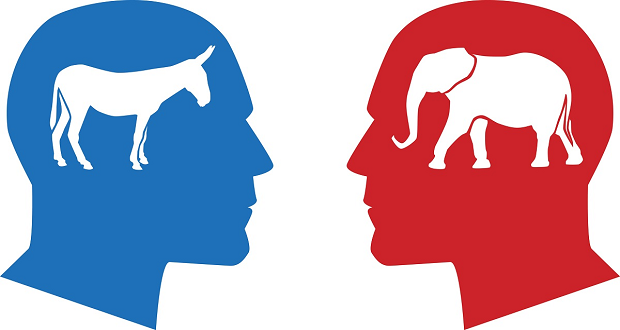New study, with implications for the hypothesis that political differences are driven by emotional dispositions. Abstract:
“Extant political–psychological research has identified stable, context-independent differences between conservatives and liberals in a wide range of preferences and psychological processes. One consistent finding is that conservatives show higher disgust sensitivity than liberals. This finding, however, is predominantly based on assessments of disgust to specific elicitors, which confound individuals’ sensitivity and propensity to the experience of disgust with the extent to which they find specific elicitors disgusting. Across five studies, we vary specific elicitors of disgust, showing that the relations between political orientation and disgust sensitivity depend on the specific set of elicitors used. We also show that disgust sensitivity is not associated with political orientation when measured with an elicitor-unspecific scale. Taken together, our findings suggest that the differences between conservatives and liberals in disgust sensitivity are context dependent rather than a stable personality difference. Broader theoretical implications are discussed.”
Link here: https://journals.sagepub.com/doi/abs/10.1177/0146167219880191

Disgust is a near-universal human emotion, but those ‘specific elicitors’ vary with time, genetics, and memetics. Some disgust is visceral, and some learned through socialization. Both forms should be considered legitimate as disgust is a defense response to potential threats. The context of this study can be reformulated in the inverse that liberally minded people have an unnatural tendency to lack those disgust sensitivities shared by many other populations.
Saw this the other day. Based on my reaction disgust level vary by degree for the same piece of information depending on how much knowledge around the information you have.. For instance I had reasons to believe this happened but when it becomes known beyond doubt it elevates the same piece of information to another level of disgust.
Following from https://www.psychologytoday.com/us/articles/201905/revolution-is-happening-in-psychology-heres-how-its-playing-out
…Say a psychologist breaks his sample of participants into three groups and expects that each will show certain differences. But the expected outcome doesn’t materialize for one group—undercutting the hypothesis—so he leaves that group out of the paper, creating the perception that the findings are more straightforward than they really are. Or perhaps, after seeing the initial results, he decides to omit certain variables or outliers from the analysis. In psychology and other fields, a p-value is a measure of probability used to determine whether results are statistically significant. Today, it’s clear that tweaks like these can render results seriously misleading and turn out artificially “significant” p-values.
“I engaged in some of those practices,” Inzlicht admits. “I’m not proud to say it, but it’s true. I know that other people engaged in those practices. I saw with my own eyes instructors at my Ivy League university instructing us to do this. At first, I thought, Oh, you’re allowed to do that? That’s standard operating procedure?”